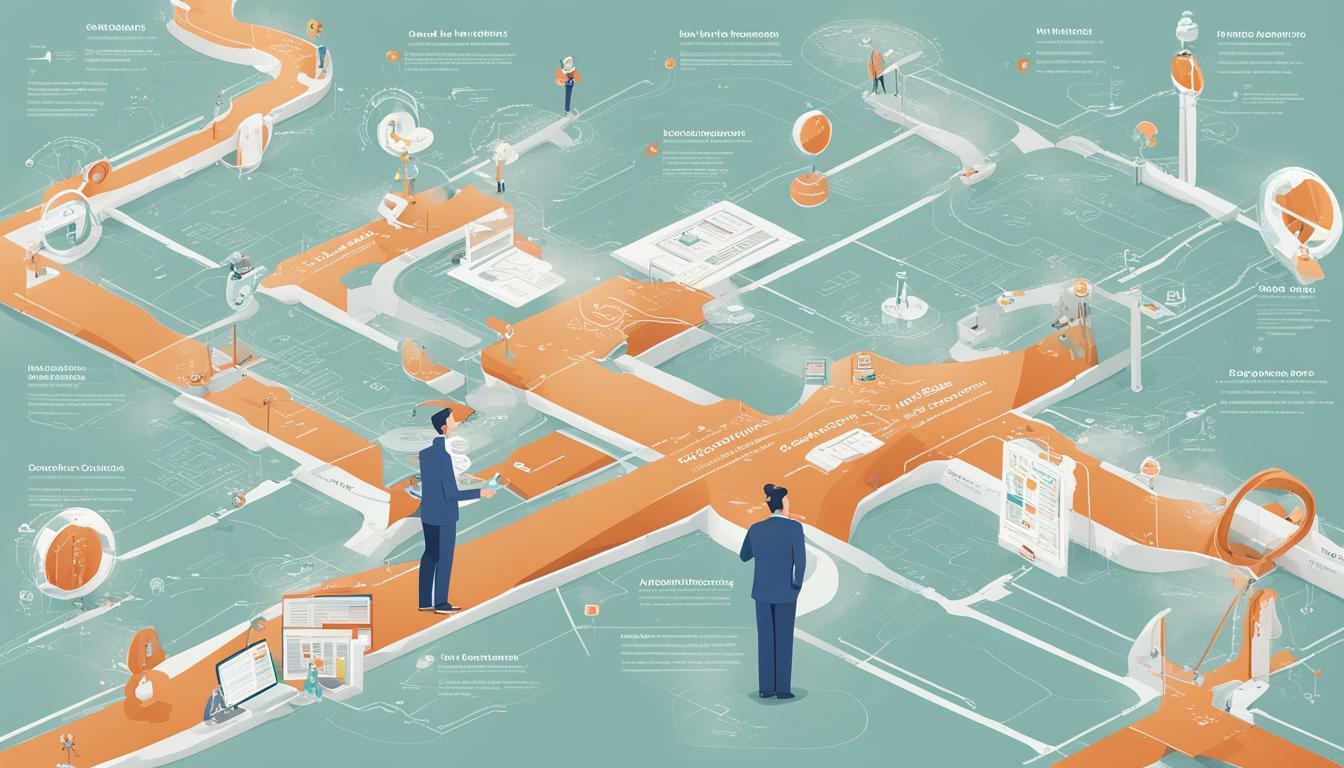Unlock The Future: Your Data Scientist Career Path Guide

Key Takeaways:
- A career in data science offers immense potential for growth and advancement.
- The demand for skilled data scientists continues to grow in various industries.
- Through this guide, you will gain the necessary information and resources to start your journey as a data scientist.
Understanding the Data Scientist Role
As a data scientist, your role is to mine and analyze complex data sets and communicate your findings to an organization to help them make informed decisions. With the increasing need for data-driven decision making, the job prospects for data scientists are excellent. To succeed as a data scientist, you must have a combination of technical and soft skills. Technical skills such as programming, data manipulation, machine learning, and statistical analysis are essential for handling large data sets. Soft skills such as critical thinking, communication, and project management are just as important to effectively translate data insights into actionable solutions. Data scientists can find employment in various sectors such as healthcare, finance, retail, and technology. With the rise of big data, the demand for skilled data scientists continues to grow, making it a lucrative and rewarding career path.
“Data scientists are experts at interpreting complex data, and their insights can lead to significant improvements in a company’s bottom line.”
Education and Training for a Data Science Career
Aspiring data scientists can pursue multiple education and training paths to gain the required skills and expertise. Many universities offer undergraduate and graduate programs in data science, which typically includes coursework in mathematics, statistics, computer science, and machine learning. For individuals looking for a more flexible and affordable option, online courses and certifications are also available. Popular online learning platforms such as Coursera, edX, and Udemy offer a wide range of data science courses taught by industry experts. These courses provide a comprehensive understanding of the fundamentals of data science, including programming, data wrangling, and data visualization. In addition to formal education, practical experience is crucial to building a successful data science career. Aspiring data scientists can gain experience through internships or personal projects, which can showcase their skills to potential employers. Competitive hackathons are another excellent way to build practical experience and network with other professionals in the field. To choose the best education and training path, it is essential to evaluate one’s current skills and expertise, as well as career goals. Choosing the right program or course can significantly impact an individual’s career trajectory, so proper research is crucial.Popular Online Data Science Courses:
| Course Name | Platform | Duration |
|---|---|---|
| Data Science Specialization | Coursera | 11 months |
| Applied Data Science with Python | Coursera | 5 months |
| Machine Learning | Stanford University, via Coursera | 3 months |
 Choosing the right education and training path is essential to kickstart a successful data science career. By gaining practical experience, building a strong foundational knowledge, and continuously learning and updating skills, individuals can thrive and advance in this rapidly growing field.
Choosing the right education and training path is essential to kickstart a successful data science career. By gaining practical experience, building a strong foundational knowledge, and continuously learning and updating skills, individuals can thrive and advance in this rapidly growing field.
Starting Your Journey: Steps to Become a Data Scientist
If you are interested in pursuing a career in data science, there are several steps you can take to get started. Step 1: Gain Practical Experience One of the best ways to gain practical experience in data science is through internships or working on independent projects. Look for opportunities that allow you to work with real-world data sets and apply your skills in statistics, machine learning, and programming languages such as Python and R. Step 2: Build a Strong Foundation in Programming and Statistics Programming languages such as Python, R, and SQL are essential for a data science career. It is also crucial to have a thorough understanding of statistics and probability concepts. There are many resources available online, such as free courses and tutorials, to help you build your skills in these areas. Step 3: Network with Industry Professionals Networking is essential in any career, and data science is no exception. Attend industry events, join online communities, and connect with other professionals in the field. Building a strong network can help you learn about job opportunities, gain insights into industry trends, and improve your chances of success as a data scientist. Step 4: Choose the Right Educational Path
Choosing the right educational path is critical to pursuing a successful data science career. While a bachelor’s or master’s degree in data science or a related field is not always necessary, it can be beneficial. Look for programs that offer courses in programming, data analysis, and machine learning. Additionally, there are many online courses and certifications available that can help you gain the skills and knowledge needed for a data science career.
Step 5: Stay Up to Date with Industry Trends
Data science is a rapidly evolving field, and it is crucial to stay updated with the latest technologies and trends. Subscribe to industry publications, attend conferences and seminars, and participate in online communities to stay informed. Continuous learning is essential to success as a data scientist.
Step 4: Choose the Right Educational Path
Choosing the right educational path is critical to pursuing a successful data science career. While a bachelor’s or master’s degree in data science or a related field is not always necessary, it can be beneficial. Look for programs that offer courses in programming, data analysis, and machine learning. Additionally, there are many online courses and certifications available that can help you gain the skills and knowledge needed for a data science career.
Step 5: Stay Up to Date with Industry Trends
Data science is a rapidly evolving field, and it is crucial to stay updated with the latest technologies and trends. Subscribe to industry publications, attend conferences and seminars, and participate in online communities to stay informed. Continuous learning is essential to success as a data scientist.
Building Essential Skills for Data Science
In order to succeed as a data scientist, it is crucial to have a strong foundation in certain skills. These skills will help you analyze and interpret data, and ultimately provide valuable insights to your organization. Here are some of the most essential skills for a data science career:Programming languages
Proficiency in programming languages such as Python and R is essential for a data scientist. These languages allow data scientists to organize, manipulate, and analyze data efficiently. They are also used in machine learning and statistical modeling, which are vital components of a data scientist’s work.Statistical analysis
Statistical analysis is another critical skill for a data scientist. It involves interpreting data using statistical methods, such as regression analysis, hypothesis testing, and Bayesian inference. This skill enables data scientists to identify patterns and trends in data, and draw meaningful conclusions.Machine learning
Machine learning involves developing algorithms that can automatically learn from data. A strong understanding of this skill is important for a data scientist to build predictive models and to develop solutions for complex problems.Data visualization
Data visualization is the representation of data in a visual format, such as charts, graphs, and infographics. It is a crucial skill for data scientists as it enables them to effectively communicate insights and findings to stakeholders in a clear and concise manner.Problem-solving
Data scientists must be strong problem solvers, with the ability to think critically and creatively. They must be able to identify problems, evaluate possible solutions, and implement the best course of action. Developing these skills is essential for a successful data science career. There are many online courses, tutorials, and resources available to help you build these skills. Additionally, participating in hackathons, data science competitions, and other community events can provide valuable opportunities to practice and improve your skills.
Navigating the Data Science Job Market
As the demand for data scientists continues to grow, navigating the job market can be a daunting task. According to the Bureau of Labor Statistics, employment of computer and information research scientists, which includes data scientists, is projected to grow 15 percent from 2019 to 2029, much faster than the average for all occupations. The data science job market is vast, with opportunities in a variety of industries, including healthcare, finance, retail, and more. Data scientists may also work for government agencies, non-profits, or start-ups. Some popular job titles for data scientists include:- Data Scientist
- Data Analyst
- Machine Learning Engineer
- Business Intelligence Analyst
- Data Engineer

Advancing Your Data Science Career:
As you progress in your data science career, there are various opportunities for growth and advancement. The field is constantly evolving and adapting to new technologies and innovations, providing ample opportunities to stay challenged and engaged. One potential career path for established data scientists is to become a data science manager, overseeing project teams and driving strategy. This role involves strong leadership and communication skills, as well as a deep understanding of the technical aspects of data science. Another option is to specialize in a particular area, such as data architecture or machine learning. This can involve further education or training, but can lead to higher earning potential and increased job satisfaction. Consulting is also a viable option for data scientists with significant experience and expertise. As a consultant, you can work with a variety of clients on diverse projects and problems, providing valuable insights and solutions. Regardless of the specific career path you choose, there are numerous opportunities for growth and development in the field of data science. Continuously learning and staying updated with the latest industry trends and technologies can help you stay at the forefront of the job market. Ultimately, the possibilities for data scientists are endless. With the growing demand for data-driven insights across all industries, there has never been a better time to pursue a career in this field. By building a strong foundation of skills and experience, networking with industry professionals, and staying committed to continuous learning, you can unlock the full potential of your data science career.
Ultimately, the possibilities for data scientists are endless. With the growing demand for data-driven insights across all industries, there has never been a better time to pursue a career in this field. By building a strong foundation of skills and experience, networking with industry professionals, and staying committed to continuous learning, you can unlock the full potential of your data science career.
What Does a Data Scientist’s Daily Routine Look Like?
The day-to-day schedule of a data scientist can vary based on the particular project or organization with which they are involved. Typical tasks they undertake at the start of the day include analysis of data sets, cleaning and organizing data, and identifying patterns and trends. A considerable amount of their time is spent developing and refining machine learning models, assessing the performance of these models and tweaking algorithms. Regular collaboration with their team, sharing their results and devising fresh strategies are all core to a data scientist’s daily duties. These responsibilities are all essential elements of their role.
Overcoming Challenges in the Data Scientist Career Path
Embarking on a career in data science may come with several challenges. However, by staying focused and proactively tackling these obstacles, you can achieve your career goals. Here are some common challenges and strategies to overcome them:1. Staying Updated with the Latest Industry Trends
In the rapidly evolving world of data science, staying up-to-date with the latest technologies, tools, and techniques is critical for career growth. One way to stay informed is to regularly read industry journals, attend data science conferences, and participate in online communities. This will keep you informed about the latest trends and techniques, and give you the opportunity to network with other professionals in the field.2. Developing a Strong Professional Network
Building a strong professional network is crucial for success in any career, and data science is no exception. Participating in industry events, attending meetups, and collaborating on projects with like-minded individuals will help you stay connected with other professionals in the field. Additionally, a strong professional network can provide valuable insights, mentorship, and even potential job opportunities.3. Continuous Learning
Continuous learning is essential for any data scientist looking to stay competitive in the field. With new technologies and paradigms emerging rapidly, it is important to invest in your education and skillset. Consider taking online courses, attending workshops, and pursuing certifications to stay ahead of the curve. Continuous learning will not only keep your skills sharp, but also demonstrate your commitment to the profession.4. Balancing Business and Technical Skills
Data scientists must balance their technical skills with business acumen in order to succeed. Being able to communicate complex technical concepts effectively to non-technical stakeholders is a key skill for data scientists. Additionally, understanding business needs and constraints is essential for creating data-driven solutions that align with organizational goals. Continuously working on enhancing your business skills will help you effectively navigate the intersection of business and technology. Overcoming challenges in a data science career path requires a combination of technical expertise, business acumen, and a continuous learning mindset. Stay focused, determined, and proactive, and you’ll be well on your way to a successful career in data science.
Overcoming challenges in a data science career path requires a combination of technical expertise, business acumen, and a continuous learning mindset. Stay focused, determined, and proactive, and you’ll be well on your way to a successful career in data science.
How Can Excel Skills Benefit Your Data Scientist Career Path?
Having proficient Excel skills can improve job prospects with Excel in your data scientist career path. By being able to effectively manipulate, analyze, and visualize data in Excel, you’ll be able to streamline processes, make more informed decisions, and ultimately add more value to your organization.






